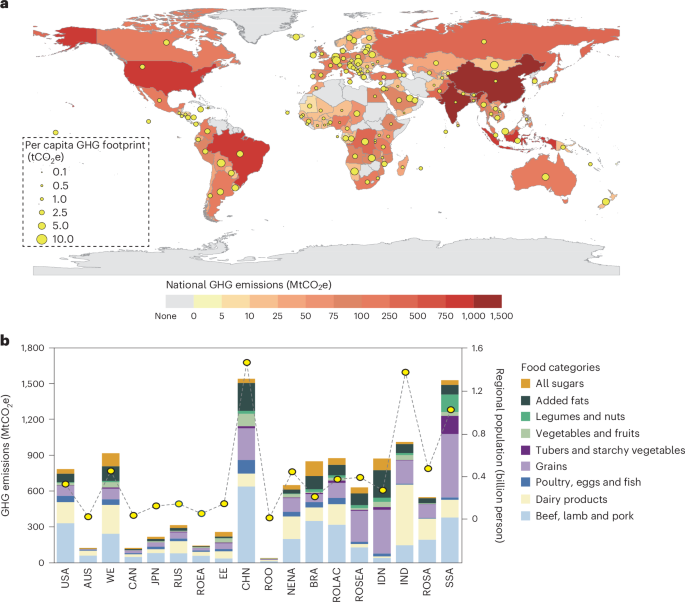The study presented in this article provides a comprehensive assessment of greenhouse gas (GHG) emissions from diets comprising 140 different food products in 139 countries or areas. The analysis is based on a global consumption-based emission inventory that includes data on GHG emissions generated during supply chain processes, such as agricultural land use, agricultural activities, and beyond-farm processes. The study uses the year 2019 as a baseline year to reflect the level of present dietary intake without the interference of the COVID-19 pandemic.
The research framework of the study involves quantifying dietary emissions from different expenditure groups by matching diets with a household-expenditure dataset. This allows for the reflection of differences and potential inequality of dietary emissions. The study also models the transition from diets in 2019 to the widespread adoption of the planetary health diet, providing insights into the emission impact of the global diet shift.
The data sources used in the study include the consumption-based food emissions inventory, which is based on data derived from the FAOSTAT. The study also considers data on food loss and waste throughout the global supply chain and at the household level, as well as food supply data. The household-expenditure data used in the study are based on the World Bank Global Consumption Database, supplemented by consumer expenditure surveys from high-income countries.
The study classifies 140 food products into 13 aggregated food categories according to the planetary health diet. It examines the dietary energy intake and emissions, accounting for food consumption and supply chain emissions. The analysis includes the calculation of dietary calorie conversions and the subtraction of food loss and waste at the household level to quantify the net intake amount of food products.
The study also analyzes the greenhouse gas emissions-Gini coefficients to measure the inequality of GHG footprints from different expenditure groups within countries, regions, and globally. Regression analysis is used to examine the relationship between national GF-Gini coefficients and per capita GDP.
The study further explores the scenario of the planetary health diet, estimating emission changes resulting from the transition to this diet. It calculates diet gaps for different food categories and emission changes from adopting the planetary health diet. The study also includes an uncertainty analysis to assess the uncertainty range of dietary emissions.
In conclusion, while the study provides valuable insights into the emission impact of dietary choices and the potential for reducing emissions through diet shifts, it also acknowledges certain limitations in data analysis and scenario setting. Future studies may address these limitations and further explore the implications of diet shifts on emissions and sustainability.

